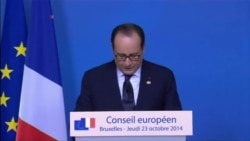ບັນດາຜູ້ນຳສະຫະພາບຢູໂຣບ ທີ່ປະຊຸມກັນຢູ່ນະຄອນ Brus-
sels ໄດ້ເຫັນດີໃຫ້ຕັດການປ່ອຍແກັສເຮືອນແກ້ວຂອງສະຫະ
ພາບຢູໂຣບ ທີ່ປະກອບດ້ວຍສະມາຊິກ 28 ລົງ ຢ່າງໜ້ອຍ 40
ເປີເຊັນ ຈາກລະດັບປີ 1990 ພາຍໃນປີ 2030.
ການຕົກລົງດັ່ງກ່າວ ຊຶ່ງໄດ້ບັນລຸກັນໃນຄືນແລ້ວນີ້ ຫລັງຈາກ
ການເຈລະຈາ ທີ່ຍືດເຍື້ອມາ ຢູ່ນະຄອນ Burssels ນັ້ນ ຍັງຮວມທັງ ການບັງຄັບໃຫ້ໃຊ້ແຫຼ່ງພະລັງງານທີ່ໃຊ້ຄືນໃໝ່ໄດ້ ຢ່າງໜ້ອຍ 27 ເປີເຊັນຂອງພະລັງງານ ທີ່ຕ້ອງການທັງ ໝົດຂອງກຸ່ມພາຍໃນວັນເວລາດັ່ງກ່າວ.
ເປົ້າໝາຍທີ່ມີຢູ່ໃນປັດຈຸບັນ ຊຶ່ງໃຫ້ຕັດ ການປ່ອຍແກັສເຮືອນແກ້ວ 20 ເປີເຊັນ ໃນປີ
2020 ນັ້ນ ແມ່ນໄດ້ບັນລຸກັນແລ້ວ ເນື່ອງຈາກພາກສ່ວນໃຫຍ່ ໃນການ ຄ່ອຍໆລົບລ້າງ
ອຸດສາຫະກຳໜັກໃນສະໄໝຄອມມູນິສຢູ່ໃນຢູໂຣບຕາເວັນອອກ.
ການຕົກລົງດັ່ງກ່າວແມ່ນແນໃສ່ ເພື່ອຮັບມືກັບການເຈລະຈາກ່ອນກອງປະຊຸມ ຄັ້ງສຳຄັນ
ກ່ຽວກັບການປ່ຽນແປງດິນຟ້າອາກາດຂອງສາກົນ ທີ່ກຳນົດຈະຈັດຂຶ້ນ ໃນປີໜ້າ ທີ່ນະ
ຄອນປາຣີ. ມີການອ້າງຄຳເວົ້າຂອງຫົວໜ້າສະຫະພາບຢູໂຣບ ທ່ານ Herman Van
Rompuy ທີ່ກ່າວວ່າ ການຕົກລົງນີ້ໄດ້ເຮັດໃຫ້ສະຫະ ພາບຢູໂຣບ “ຢູ່ໃນບ່ອນນັ່ງຄົນ
ຂັບ” ກ່ອນໜ້າກອງປະຊຸມສຸດຍອດ ປີ 2015 ທີ່ນະຄອນປາຣີ.
ໃນການສົ່ງຂໍ້ຄວາມຜ່ານທາງ Tweeter ນັ້ນ ທ່ານ Van Rompuy ຮ້ອງຂໍ້ຕົກລົງນີ້ວ່າ
“ຂ່າວດີສຳລັບດິນຟ້າອາກາດ” ສາທາລະນະສຸກ ແລະການສ້າງ ວຽກງານແບບຍືນຍົງ.
European Union leaders meeting in Brussels have agreed to cut greenhouse gas emissions in the 28-nation bloc to at least 40 percent below 1990 levels by 2030.
The deal, reached overnight after protracted negotiations in Brussels, also includes requirements that renewable energy sources fuel at least 27 percent of the bloc's energy needs by that date.
An existing goal of a 20 percent emissions cut by 2020 already has been met, due in large part to the phase-out of communist-era heavy industry in Eastern Europe.
The deal is aimed at countering climate change ahead of key international climate negotiations set for late next year in Paris. EU head Herman Van Rompuy was quoted as saying the deal puts the EU "in the driving seat" ahead of the 2015 Paris summit.
In a tweet, Van Rompuy called the deal "good news for climate," public health and sustainable jobs.
The Brussels negotiations stretched into Friday morning, as Poland fought to protect its coal industry and its miners, while other states fought to protect interests ranging from nuclear power plants to cross-border power lines.
Earlier Thursday, the EU earmarked $31 million for further research aimed at developing Ebola virus vaccines and clinical trials.
The fast-track allotment was approved as EU leaders appointed Cypriot Christos Stylianides as the bloc's Ebola "czar." Stylianides is the incoming EU commissioner for humanitarian aid.
The Ebola action is part of an overall EU commitment of $750 million.





